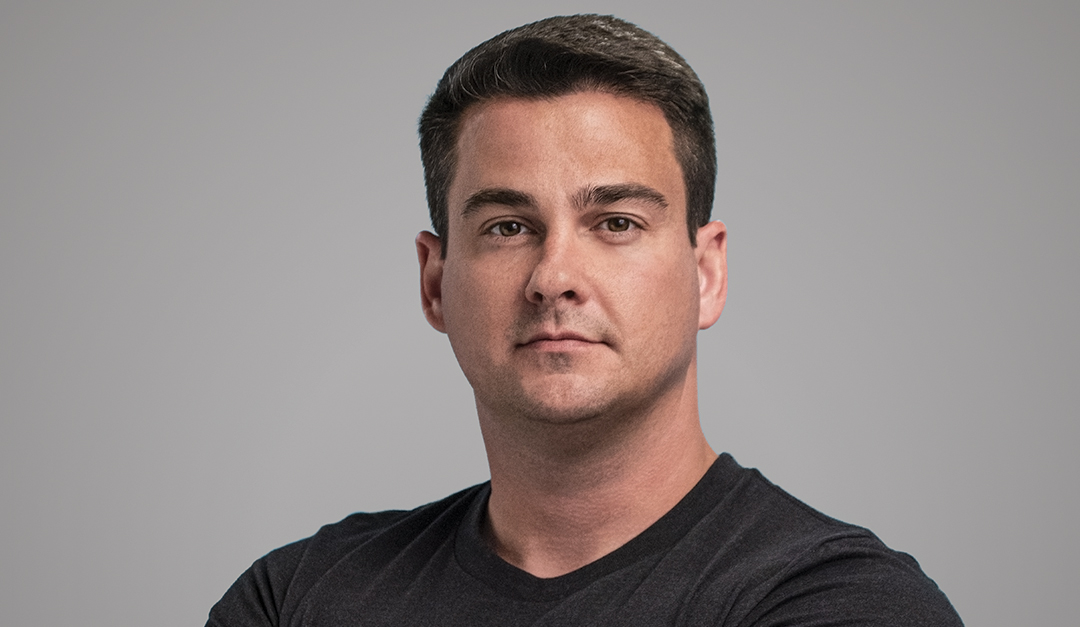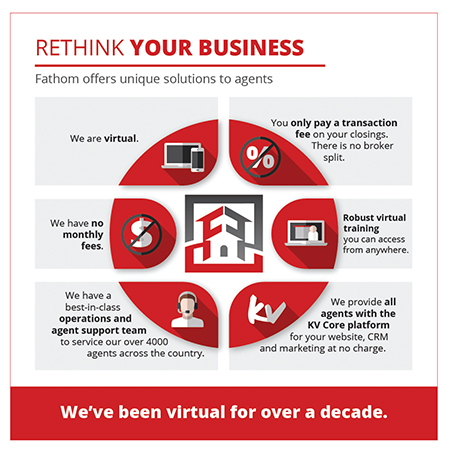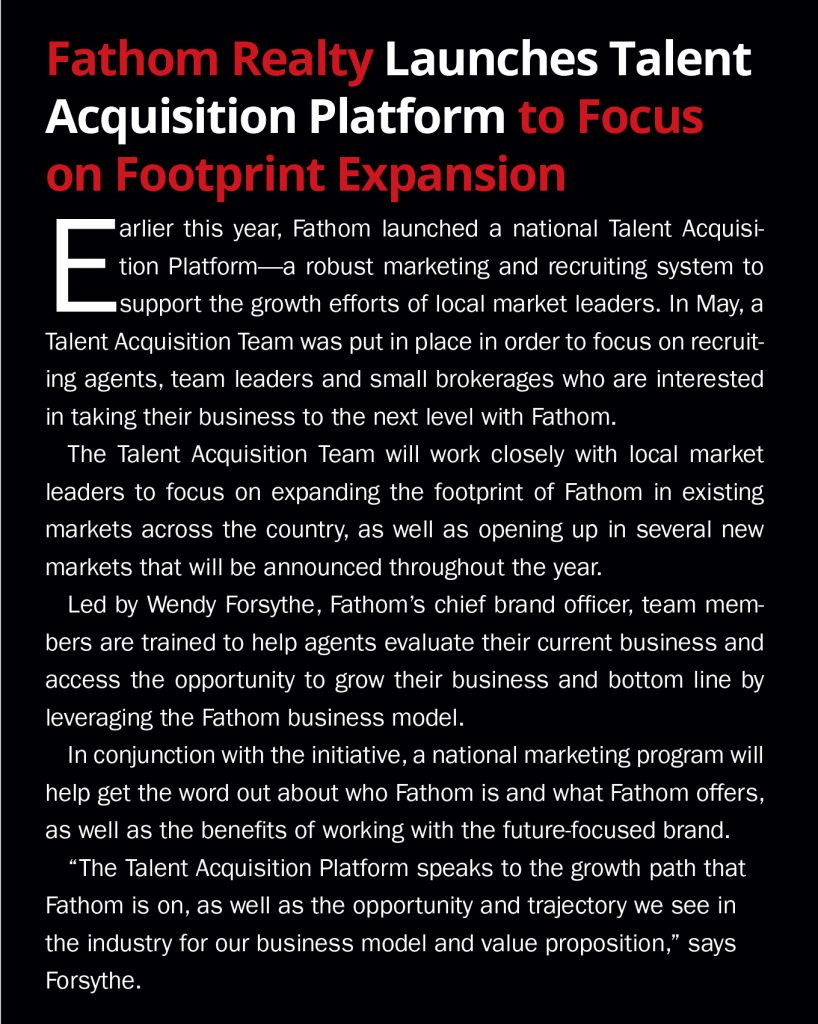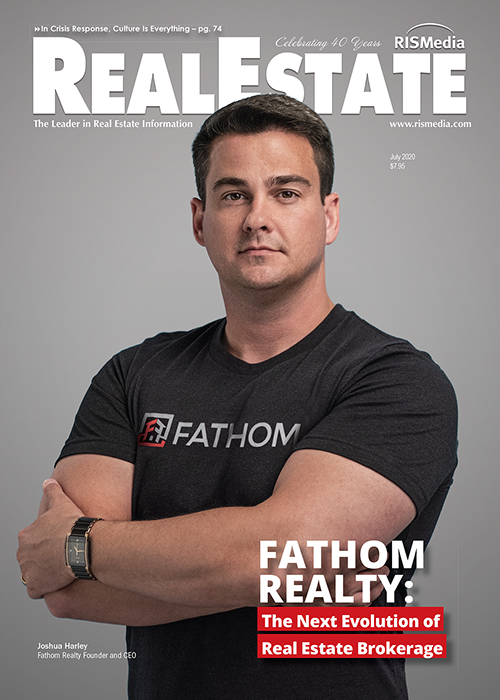 Editor’s Note: This is the cover story in the July 2020 issue of RISMedia’s Real Estate magazine. Subscribe today.
Editor’s Note: This is the cover story in the July 2020 issue of RISMedia’s Real Estate magazine. Subscribe today.
Founder and CEO Joshua Harley continues to innovate and disrupt the status quo
The next evolution of real estate brokerage has arrived. Leading the charge is Joshua Harley, founder and CEO of Fathom Realty—a cloud-based, technology-driven, full-service real estate brokerage, now operating in 24 states. Constantly looking for new ways to innovate and disrupt the status quo, Harley has been perfecting the non-traditional business model for over a decade. What began with a vision to provide agents with the greatest value in the industry has grown into an agent-centric brokerage with a primary focus on serving agents and helping them grow their business while providing the industry’s best commission splits, technology and training, as well as the highest level of support. Having closed nearly 18,000 transactions in 2019 alone, Fathom is poised for significant growth—and continued success—as the future unfolds. Paving the way is their decision to go public in 2020, which will position Fathom as the first 100-percent commission, transaction-fee, non-traditional brokerage to go public on the NASDAQ.
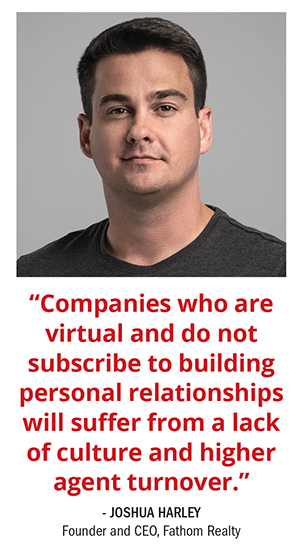 A Powerful Leadership Concept
A Powerful Leadership Concept
At the center of Fathom’s business model is a servant leadership philosophy that Harley and his entire management team aspire to on a day-to-day basis.
“There’s an age-old saying that we subscribe to, which states that ‘whoever wants to be great, must first become a servant to all,'” explains Harley. “This speaks to servant leadership long before it was ever a catchphrase, and it’s also one of the most powerful leadership concepts in business once you understand why it matters and how it works.”
Deeply ingrained in Fathom’s culture, it’s more than just a core value. It’s a way of life.
“The culture at Fathom is all about servant leadership, and I love that,” says Chief Brokerage Operations Officer Samantha Giuggio. “It’s a catchphrase we hear so often, but what makes it unique at Fathom is that it’s not just a term. Everything we do at the company is focused on the agent and, more importantly, serving the agent at the highest level possible.”
While many companies focus their efforts on recruiting or even their brand, Fathom has turned the narrative upside down—placing the agent at the center of everything. With 4,000-plus agents, this is no easy feat, but by changing the focus, something important has happened.
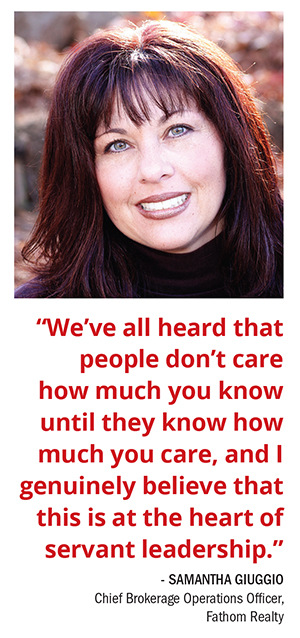 “By personally helping each agent be their best, Fathom, as a whole, closes more transactions, generates more revenue and attracts more agents,” says Harley, who applies this same principle to his own leadership style.
“By personally helping each agent be their best, Fathom, as a whole, closes more transactions, generates more revenue and attracts more agents,” says Harley, who applies this same principle to his own leadership style.
“Fathom is not about me, which is why I didn’t name the company after myself,” says Harley, who goes on to explain that his role is to serve and inspire each and every leader to be the best versions of themselves. “I strive to be a servant-leader who our agents can look to and say without question that I care about them and place their needs first.”
“We’ve all heard that people don’t care how much you know until they know how much you care, and I genuinely believe that this is at the heart of servant leadership,” says Giuggio.
Embracing an Entrepreneurial Mindset
To truly excel in a non-traditional business model like the one Fathom offers, an entrepreneurial mindset is essential.
True entrepreneurs like Giuggio—who joined Fathom as an agent back in 2010—are attracted to the brand for a variety of reasons. Topping the list? Agents who join the company have the flexibility to be creative when building their brand and growing their business, driving the process in their own unique way.
“As an entrepreneur, I knew that I needed to invest in myself,” says Giuggio, who explains that she started at Fathom for the commission, but ultimately stayed for the culture.
“Once I joined Fathom, I was able to reinvest in my own business, and was thankful for how quickly my business grew,” she adds. Today, Giuggio oversees the state brokers, local market leaders, brokerage operations, training and agent services. As a member of Fathom’s executive team, she is passionate about helping real estate professionals get acclimated with the systems and technology they have access to.
At the center of it all is IntelliAgent, a proprietary technology platform that has been customized to enhance the business so that agents can grow along with it.
“I’m a licensed agent myself, so I try to stay connected with our agents in order to understand how real estate is being conducted, as well as their likes and dislikes,” says Giuggio. “This enables us to grow and expand on things in order to add value to our agents, which is at the heart of having our own proprietary technology.”
Embracing the entrepreneurial mindset even further, Fathom encourages agents to take an active role in building their own personal brand.
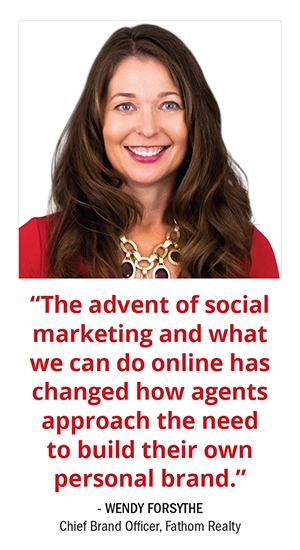 “Having the mindset of being a business owner as an independent agent, who partners with the right broker who can support them, is what we’re all about at Fathom,” says Chief Brand Officer Wendy Forsythe.
“Having the mindset of being a business owner as an independent agent, who partners with the right broker who can support them, is what we’re all about at Fathom,” says Chief Brand Officer Wendy Forsythe.
To that end, balancing the brokerage brand with the agent’s personal brand is mission critical given the evolution within the industry that has placed the agent’s brand front and center among consumers looking for a real estate professional to help guide them through the home-buying or -selling process.
“The advent of social marketing and what we can do online has changed how agents approach the need to build their own personal brand,” explains Forsythe, “and it’s our belief that it’s important for the brokerage to embrace that need in the market.”
Building a Profitable Business
As the real estate industry continues to change and evolve, so too, does the traditional brokerage model, which has set the stage for the dramatic growth of Fathom’s 100-percent commission, transaction-fee business model.
In fact, Fathom’s agents enjoy a higher net income through the brokerage’s flat-fee-based commission splits, allowing them to invest more money into growing their business.
“With our commission model, our agents are able to build a more profitable business, as they’re allowed to keep the highest percentage of their commission possible without sacrificing support, technology or training,” says Harley.
By simply joining Fathom, agents who move over from a traditional brand stand to increase their income by over 30 percent, on average, through their commission savings.
“Even in a down market and selling 20 percent fewer homes, an agent who moves over can net 10 percent more income than they did previously,” explains Harley, “which can be life-changing for some agents.”
“In the past, the cost of the broker providing facilities, training and marketing was very different than it is today, and the traditional broker split model reflects that,” says Forsythe.
“By leveraging technology and developing virtual best practices, we’ve been able to take all of the costs that a traditional broker puts into services and facilities that agents don’t use, and put them back into the pockets of agents,” adds Forsythe. “This allows us to support them on their quest to become better entrepreneurs and run a better business so that they can grow their income—and, in turn, their bottom line.”
Officially joining Fathom earlier this year, Forsythe has been a career real estate professional, but her interest in non-traditional business models was piqued when she experienced first-hand the challenges associated with operating a traditional brokerage in a down market.
“I thought there must be a better way for brokerages to be profitable and provide a value proposition to agents that makes sense and is adaptive to the way in which technology, marketing and training have changed,” adds Forsythe. “And that’s where the Fathom business model is, and why I believe it makes sense for today…and the future.”
Living in a Virtual World
With a decade of experience operating in a virtual capacity, Fathom has been at the forefront of the evolving shift from brick-and-mortar operations to a more mobile work environment that emphasizes the need for real estate professionals to be out in the field and face-to-face with clients and prospects.
And while no one could have predicted what 2020 would bring, the premise that Fathom was built on allowed the brokerage to be in the best position possible to navigate the challenges associated with the current coronavirus pandemic without missing a beat.
“When the effects of COVID-19 began to take hold on the country and businesses across the board began to shut their doors temporarily, many traditional brokers had to scramble to figure out how to conduct business with a workforce that was no longer in the office,” says Forsythe.
But business continued without interruption at Fathom brokerages, which operate in 24 states today.
“None of our agents experienced a disruption in how Fathom supported their business, which they were very appreciative of—as were we,” adds Forsythe.
While the benefits of a virtual brokerage abound, Harley underscores the importance of bringing agents together on a regular basis for in-person training and social events.
“Companies that are virtual and do not subscribe to building personal relationships will suffer from a lack of culture and higher agent turnover,” says Harley. “That said, being virtual allows us to build a financially solid business.”
Offices typically equate to one of the highest costs for any real estate company, if not the highest cost, and so the difference between having an office or not can be the ultimate differentiator when it comes to a brokerage being profitable or not.
Closing nearly 18,000 transactions with fewer than 25 staff between the brokerage operations and accounting teams in 2019, Fathom takes pride in operational efficiency.
The key to operating efficiently as the brokerage business continues to change, according to Giuggio, is a knowledge of both your customer and your product, in addition to managing change and making sure the correct people are in place to uphold the values upon which the brand was built.
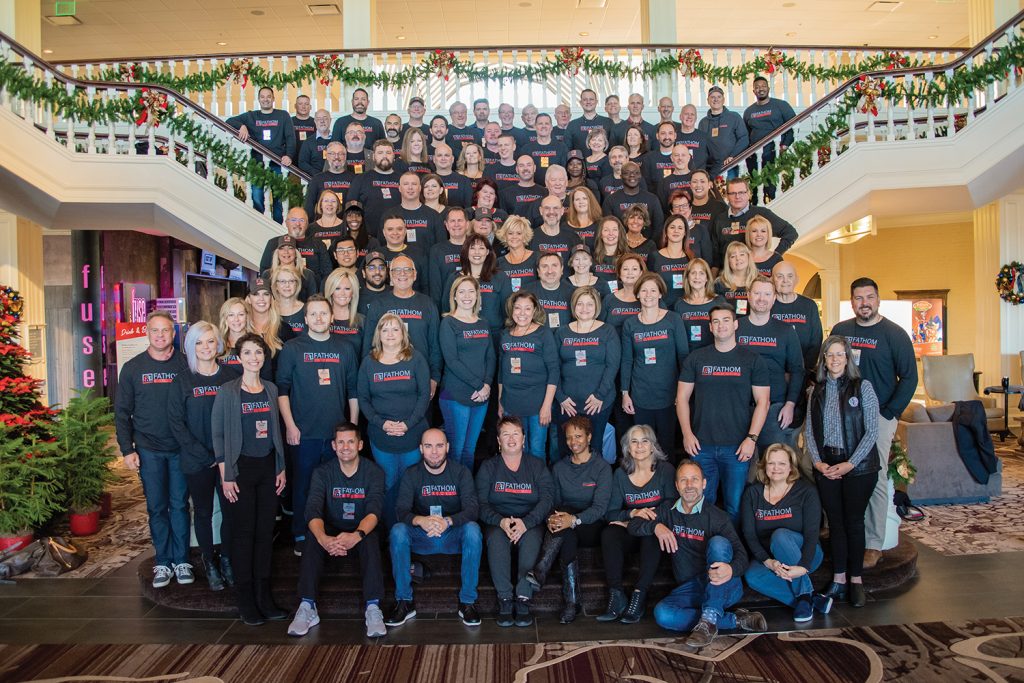
Looking Toward the Future
Having experienced rampant growth over the course of the last decade, the future is looking brighter than ever for Fathom, as agents continue to embrace the non-traditional brokerage concept.
“We’re changing lives,” says Giuggio, who notes that her favorite part of her job is seeing the impact that Fathom has made on others’ lives.
“Dealing with the hypergrowth that we’ve been blessed to experience has taught me many things, the most important being that change is constant,” adds Giuggio. “Fostering that culture so that people aren’t afraid of it is critical.”
Anticipating a high level of consolidation in the industry, Forsythe points to mergers and acquisitions as a key component of the brand’s growth strategy moving forward.
“There are a lot of smaller independent brokerages today that aren’t big enough to leverage the economic elements that result in profitability,” says Forsythe. “We can attract these brokerage owners to Fathom as a leader in the market and take the operational burden off their shoulders so they can focus on working with their agents, helping them grow their business and get transactions done.”
And in true Fathom fashion, agents will be a key resource, thanks in large part to Fathom’s unique stock program. Giving agents stock in Fathom for more than three years, the program provides agents the opportunity to own a piece of the future by earning stock grants for every agent they refer and every sale they close.
“We recognize that our agents are why we exist,” says Harley. “While the majority of our revenue is generated from our agents’ activity, more than 50 percent of our agent growth is from our agents referring other agents, so they deserve to take part in our mutual success—and that can happen best through ownership.”
The firm’s rapid growth has also fueled the decision to go public.
“We’ve spent 18-plus months preparing Fathom to go public on the NASDAQ,” says Harley. “We’re watching the market closely, and it’s our goal to go public this year.”
For more information, please visit www.fathomrealty.com.
 Paige Tepping is RISMedia’s managing editor. Email her your real estate news ideas to paige@rismedia.com.
Paige Tepping is RISMedia’s managing editor. Email her your real estate news ideas to paige@rismedia.com.



